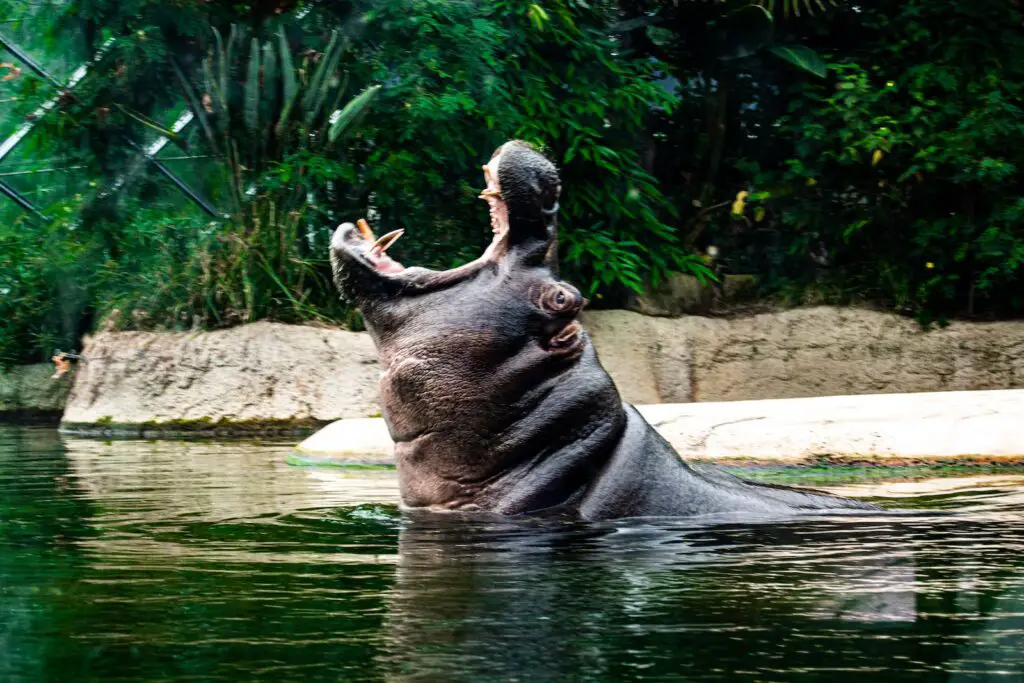Why are Hippos so aggressive?
Hippos are aggressive because of their territorial nature, hierarchical social structure, and vulnerability to being threatened. They fiercely defend their water sources and can be especially aggressive during mating season.
While they rarely attack humans without provocation, they may perceive humans as a threat if they believe their territory is being invaded or if they are cornered, and may become defensive or aggressive in response.
There are several reasons why hippos are infamous for being violent creatures.
First of all, hippos are aggressive animals who become so when they perceive a threat to their area. Since they depend on their water sources to stay cool and hydrated, they are especially protective of them.
Second, while hippopotamuses are social creatures with a hierarchical social structure, they also exhibit aggressive behaviour, particularly among dominant males, especially during the breeding season.
Lastly, hippos have a reputation for being easily scared and, if threatened, can turn aggressive or protective. This is especially true if they feel enclosed or confined, like when they are on land and perceive humans or possible predators to be all around them.
It’s also worth noting that, while hippos are known to be aggressive, they rarely attack humans without provocation.
They may perceive humans as a threat and become aggressive if they enter their territory or get too close. As a result, it is critical to always be cautious and respectful when in the presence of these powerful animals.

The Aggressive Nature of Hippos
Hippos are well recognised for their aggressive behaviour, which is primarily motivated by their social hierarchy, territoriality, and susceptibility to danger.
They fiercely guard their water sources, and if they feel their area is being violated, they may even attack humans.
Hippos can easily startle and go into defensive mode if they feel surrounded or threatened because dominant males are especially aggressive during mating season.
Although hippos usually don’t attack people without being provoked, it’s still crucial to show them respect and caution when you come across them in the wild.
More human deaths have been caused by hippos than by any other big terrestrial mammal, making them one of Africa’s most lethal creatures.
They can readily crush and maul their victims, including humans, with their strong jaws and pointed fangs. Due to their intense social nature and the fact that they dwell in huge groups known as pods or bloats, they are also known to exhibit aggressive behaviour.
In these socially hierarchical groupings, dominant men assert their dominance over inferior males and females.
Hippos can be dangerous, even to seasoned wildlife handlers, due to their unpredictable nature and short fuse.
They may attack canoes and boats on waterways, as well as people and other animals who may approach too closely to their territory, as a result of their aggressive disposition and sensitivity to dangers.
Hippos’ poor vision makes it possible for them to mistakenly perceive people or objects as potential dangers, which increases the possibility that they would act aggressively.
Hippos are known for being aggressive, yet they also have a softer side. As highly social creatures, they communicate with one another by using vocalisations and body language.
They also play and exhibit caring behaviours with their young, including as grooming and cuddling.
Understanding hippos’ intricate social structure and communication can improve human relations with these magnificent creatures and lower the likelihood of conflict.
Why do Hippos attack humans?
Several factors can cause hippos to attack people. Hippos aggressively defend their water supplies and may perceive humans as a threat if they enter their territory, which is one of the main causes.
Hippos can also strike if they feel cornered, startled, or threatened. Hippos can be startled and can attack humans if they unintentionally come across them on land or in the water.
Moreover, powerful males become extremely hostile during mating season and may fight other males or anybody who approach too closely.
Hippos should always be treated with respect and caution because they are wild animals.
Hippos should never be approached on foot by humans in the wild and should never be brought too close
Hippos should never be approached on foot by humans in the wild and should never be brought too close Also, it’s critical to respect their domain and refrain from upsetting them in their natural environment.
Humans can lessen the likelihood of conflicts with hippos and prevent potential assaults by taking these steps.
Are Hippos the most aggressive animal?
One of the most hazardous creatures in Africa, hippopotamuses are notorious for their violent temperament. While not being the most aggressive animal overall, wolves are undoubtedly among the deadliest to people, having killed more people than any other large land mammal.
Hippos are aggressively protective of their water sources because they depend on them to stay cool and hydrated.
Hippos are aggressively protective of their water sources because they depend on them to stay cool and hydrated. They have a hierarchical social structure, are very gregarious, and dwell in big groups.
During mating season, dominant males may exhibit tremendous aggression, assaulting not only other males but also boats and canoes that invade their territory.
Hippos can strike suddenly and without notice, even in surroundings that appear to be tranquil.
They can easily crush and smash their prey, including humans, with the help of their strong jaws and pointed fangs.
Their poor eyesight, which can cause them to misread things or people for possible dangers, makes their hostility even worse.
Although hippos are notorious for their aggressiveness, it’s crucial to remember that they rarely attack people without cause.
The majority of human fatalities happen when people unintentionally invade their domain or get too close, which makes the hippos think they are a threat. Thus, it’s crucial to use caution and respect while coming into contact with these strong animals in the wild.
In conclusion, while hippos are not the most aggressive animals in general, their territorial behaviour, social hierarchy, and unpredictable nature make them among the most dangerous to humans.
Understanding their behaviour and avoiding conflicts can help reduce the risk of attacks and promote coexistence with these magnificent animals.
So, What makes Hippos so dangerous and aggressive?
Because of their territorial nature, hierarchical social structure, and sensitivity to threats, hippos are considered dangerous and aggressive.
They are fiercely protective of their water sources and will defend their territory fiercely against intruders, including humans.
Hippos are also highly social and live in large groups, with a male-dominated hierarchical social structure.
During the mating season, dominant males can become extremely aggressive, attacking other males as well as boats and canoes that enter their territory.
Furthermore, hippos have poor vision and may mistake objects or people for potential threats, increasing their likelihood of attacking.
Their strong jaws and sharp teeth allow them to easily crush and maul their prey, including humans.
Hippos are also extremely unpredictable, attacking without warning even in seemingly calm situations.
They are vulnerable to sudden movements and may feel threatened if they are caught off guard or cornered.
It’s also worth noting that hippos can reach speeds of up to 30 miles per hour, making it difficult for humans to outrun them.
In conclusion, because of their territorial behaviour, social hierarchy, sensitivity to threats, and powerful physical abilities, hippos are dangerous and aggressive.
When encountering these animals in the wild, humans should exercise caution and respect and avoid approaching them too closely or entering their territory.
Humans can reduce the risk of conflict with hippos and avoid potential attacks by taking these precautions.
